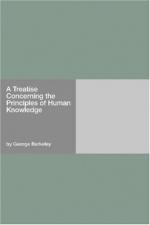12. That number is entirely the creature of the mind, even though the other qualities be allowed to exist without, will be evident to whoever considers that the same thing bears a different denomination of number as the mind views it with different respects. Thus, the same extension is one, or three, or thirty-six, according as the mind considers it with reference to a yard, a foot, or an inch. Number is so visibly relative, and dependent on men’s understanding, that it is strange to think how any one should give it an absolute existence without the mind. We say one book, one page, one line, etc.; all these are equally units, though some contain several of the others. And in each instance, it is plain, the unit relates to some particular combination of ideas arbitrarily put together by the mind.
13. Unity I know some will have to be A simple or uncompounded idea, accompanying all other ideas into the mind. That I have any such idea answering the word unity I do not find; and if I had, methinks I could not miss finding it: on the contrary, it should be the most familiar to my understanding, since it is said to accompany all other ideas, and to be perceived by all the ways of sensation and reflexion. To say no more, it is an abstract idea.
14. A third argument ad HOMINEM.—I shall farther add, that, after the same manner as modern philosophers prove certain sensible qualities to have no existence in Matter, or without the mind, the same thing may be likewise proved of all other sensible qualities whatsoever. Thus, for instance, it is said that heat and cold are affections only of the mind, and not at all patterns of real beings, existing in the corporeal substances which excite them, for that the same body which appears cold to one hand seems warm to another. Now, why may we not as well argue that figure and extension are not patterns or resemblances of qualities existing in Matter, because to the same eye at different stations, or eyes of a different texture at the same station, they appear various, and cannot therefore be the images of anything settled and determinate without the mind? Again, it is proved that sweetness is not really in the sapid thing, because the thing remaining unaltered the sweetness is changed into bitter, as in case of a fever or otherwise vitiated palate. Is it not as reasonable to say that motion is not without the mind, since if the succession of ideas in the mind become swifter, the motion, it is acknowledged, shall appear slower without any alteration in any external object?




